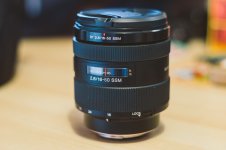/armchair psychology random thinking out loud moment coming up….
In respect to the moving to mirrorless camera argument….narh, I doubt you will.
Put it this way, you want the best tech in your camrea, your OCD can't stop you having the best, as illustrated just now.
Also, the current crop of mirrorless is streets ahead most and equal or better than than some DSLR was 10 years ago and photographers back then shooting great wedding photos. I would say the latest Fuji XT1 is as on very close performance as the 5D in ISO performance (I am just making a educated guess)
, even the 5Dii, I doubt any average Joe Blogg can tell a web shot or in print.
Both camps will always move the tech forward, Mirrorless is playing catch up, and will conintue to be, for it not to, DSLR will need to stop moving…that aren't happening. What I am trying to say is, if you are going to do it because of size reason, you would've done it already, instead of the D810, you would've got a Sony full frame mirrorless or something. There isn't this abatory line where "this quality is good enough" or "when they can do ISO 3200 this clean is good enough" so when mirrorless get there and I will jump camp. To say that it means your D800 is never good enough because if the D800 is the line where if a mirrorless gets to where you would jump ship then you wouldn't have got the D810. And it also means that the D700 that you had wasn’t good enough. The fact that you upgraded to the D810 means you are on a continueous chase for better tech. There is no shame in that, I too want the latest and greatest and proud of it.
One need to let go of the tech, accept that it'll be behind DSLR, embrace the size is the main advantage and forget about all that tech stuff in order to be happy about mirrorless. With all the stuff you mentioned in the past few years on charts and tech….I apologise for jumping to a conclusion but you do not come across as someone who can just let that go so I do think you will continue to be a DSLR shooter.
On the other hand, I have a photographer friend whom I KNOW he will, he still shoots D700, that is good enough for him, he gets great shots. In fact, he has been shooting it with a Fuji X-100S for the past year or so alongside his D700. He absolutely loves it. He doesn't care for the D800, its ISO and all that basket of goodies, he simply adores the size of the Fuji, embraces what it offers and don't compare his kit to others and enjoy what he has and the beautiful phots that it produces.
So the question is, can you ever place size and convenience above tech spec?
/armchair moment.


 Now to settle down
Now to settle down 



